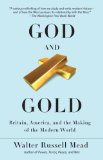Summary | Excerpt | Reviews | Beyond the Book | Readalikes | Genres & Themes | Author Bio

Critics' Opinion:
Readers' Opinion:
First Published:
Oct 2007, 464 pages
Paperback:
Oct 2008, 464 pages
 Book Reviewed by:
Book Reviewed by:
Paul Hughes
Buy This Book
Evil empires throughout history have always trampled on human rights. American presidents during the Cold War routinely denounced Soviet mistreatment of dissidents and religious believers. Here again they were merely following in the footsteps of the Lord Protector. Cromwell's speech of 1656 chronicled Spanish atrocities: he referred to a messenger of the Long Parliament whom the Spanish cruelly murdered and noted that when the English ambassadors "asked satisfaction for the blood of your poor people unjustly shed in the West Indies, and for the wrongs done elsewhere, when they ask liberty of conscience for your people who traded thither,—satisfaction in none of these things would be given, but was denied."[9]
All we ask, Cromwell told Parliament, is liberty. Only that.
Describing the recent, failed negotiations with Philip IV, king of Spain, Cromwell wanted to show how reasonable, how moderate, the English demands had been. "We desired such a liberty as they [visiting English merchants in Spanish territory] might keep Bibles in their pockets, to exercise their liberty of religion to themselves and not be under restraint. But there is not liberty of conscience to be had . . ."[10]
Don Felipe, tear down that wall!
If empires of evil have much in common across the centuries, so too do alliances for good. America and its Cold War allies, like the Protestant allies of Cromwell's England, were fighting for more than their own—perish the thought—selfish interests. Their fight is the fight for good, right, and human rights everywhere.
"All the honest interests," said Cromwell, "yea, all the interests of the Protestants in Germany, Denmark, Helvetia, the Cantons, and all the interests in Christendom are the same as yours. If you succeed well and act well, and be convinced what is God's interest and but prosecute it, you will find that you act for a very great many people that are God's own."[11]
"America," Reagan told the evangelicals, "has kept alight the torch of freedom, but not just for ourselves but for millions of others around the world."[12]
Cromwell and Reagan faced other problems in common. There was more continuity to the Cold War than to England's long and intermittent contest with Spain, but both rivalries dragged on inconclusively for decades, sometimes in the foreground, sometimes on the back burner, with intervals of détente, reversals of alliance, and many changes in fortune. After the failure of the Armada in 1588, Spain could not attack England at home. English forces were never strong enough to wage sustained warfare on the Spanish mainland. Instead, the intermittent conflict moved indecisively through what we would now call the third world—the scattered colonial dependencies of the two powers and over the trade routes and oceans of the world. English hawks, often Puritans and merchants, wanted an aggressive anti-Spanish policy that would take on the pope while opening markets; moderates (often country squires uninterested in costly foreign ventures) promoted détente.
There was another problem—a domestic one. "And truly he [the Spaniard] hath an interest in your bowels," Cromwell told his audience. "He hath so. The Papists in England,—they have been accounted, ever since I was born, Spaniolised."[13] Ronald Reagan knew just what Cromwell meant, though with the changing fashions in metaphors he would have talked about a fifth column, rather than a Communist "interest in our bowels."
For almost a century, England had wrestled with the problem of how to treat its Catholic minority. Existing Penal Laws against Catholics had been tightened considerably after Pope Pius V excommunicated Elizabeth I in 1570 and declared her an illegitimate queen whom no Christian was bound to obey. The question for Elizabeth was how to tell the difference between Catholics loyal to the throne, or at least willing to live peacefully under it, and those actively engaged in plotting to murder the queen and plunge the country into civil war. The threat of invasion from Spain grew in the 1580s. Pressure on Catholics increased; it became illegal for a Catholic priest to set foot in England, and for any English subject to house or help a priest in any way. The penalty was death. There were also hefty fines for those who refused to attend Protestant services. When the Armada sailed from Spain in 1588, the noose tightened again. Local officials were ordered to imprison Catholics deemed a threat to security; enforcement of the laws relaxed once the threat of invasion had passed.[14]
Excerpted from God and Gold by Walter Russell Mead Copyright © 2007 by Walter Russell Mead. Excerpted by permission of Knopf, a division of Random House, Inc. All rights reserved. No part of this excerpt may be reproduced or reprinted without permission in writing from the publisher.





The Funeral Cryer by Wenyan Lu
Debut novelist Wenyan Lu brings us this witty yet profound story about one woman's midlife reawakening in contemporary rural China.
Your guide toexceptional books
BookBrowse seeks out and recommends the best in contemporary fiction and nonfiction—books that not only engage and entertain but also deepen our understanding of ourselves and the world around us.